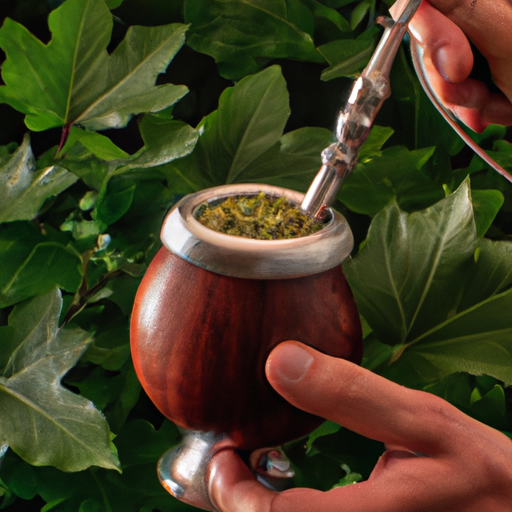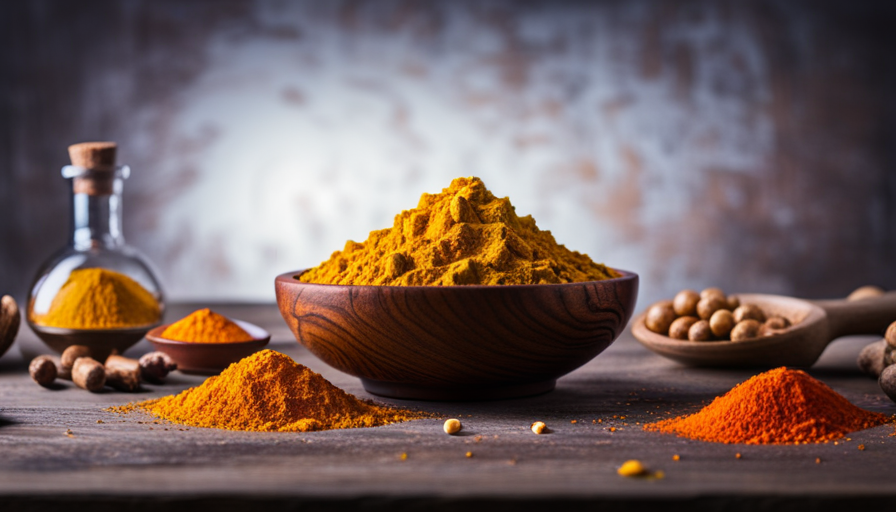I have always adored tea, yet the idea of enjoying turmeric tea never crossed my mind. Nevertheless, after discovering the numerous health advantages of this vibrant spice, I was persuaded to experiment with it.
And let me tell you – the taste was not what I expected. At first sip, turmeric tea has a strong earthy flavor that’s slightly bitter. But as you continue to drink it, the spicy undertones become more prominent and add a pleasant kick to the overall taste.
It’s definitely not your average cup of tea, but there’s something comforting and soothing about its unique flavor profile. So if you’re curious about trying turmeric tea but unsure about what it tastes like, keep reading – I’ll break down everything you need to know.
Key Takeaways
- Turmeric tea has a unique taste profile that is earthy, slightly bitter, and spicy.
- Turmeric tea has numerous health benefits, including anti-inflammatory effects, improved digestion, and promotion of healthy gut function.
- To make turmeric tea, you only need a few basic ingredients: water, turmeric powder or fresh grated turmeric root, black pepper, and honey (optional).
- Turmeric tea can be enjoyed hot or cold and can be enhanced with other spices, sweeteners, or milk alternatives for flavor variations.
What is Turmeric Tea?
Turmeric tea’s a warm, soothing drink made with turmeric powder and boiling water. It’s been used for centuries in traditional Ayurvedic medicine as a natural remedy for various health issues. Not only does it have numerous health benefits, but it also has an interesting taste.
Brewing techniques for turmeric tea can vary depending on personal preference. Some people prefer to add black pepper or ginger to enhance the taste and increase the absorption of curcumin, the active ingredient in turmeric that provides its health benefits. Others may add honey or lemon juice to give it a sweeter or tangier flavor.
When brewed properly, turmeric tea has a unique earthy and slightly bitter taste that some describe as similar to ginger or mustard. The aroma is also distinct with notes of spice and warmth. However, if not brewed correctly, the taste can be overpowering and unpleasant.
Moving onto the subsequent section about ‘the health benefits of turmeric tea,’ this flavorful beverage is packed with antioxidants and anti-inflammatory compounds that have been shown to improve brain function, reduce inflammation and pain in conditions like arthritis, lower cholesterol levels, boost immunity, aid digestion, and even prevent certain types of cancer.
Overall, turmeric tea isn’t just delicious but also highly beneficial for overall well-being when consumed regularly.
The Health Benefits of Turmeric Tea
You’ll be pleased to know that incorporating turmeric tea into your daily routine can offer a range of health benefits. One of the most notable is reducing inflammation in the body. Turmeric contains an active ingredient called curcumin, which has been shown to have powerful anti-inflammatory effects.
Regularly drinking turmeric tea can help alleviate symptoms of conditions such as arthritis, osteoporosis, and even heart disease. Another benefit of turmeric tea is improved digestion. Turmeric stimulates the production of bile in the liver, which aids in breaking down fats and promoting better digestion overall.
It also helps to soothe stomach pain and reduce bloating. This makes it a great option for those who suffer from digestive issues or simply want to promote healthy gut function. Overall, there are many reasons why you should consider adding turmeric tea to your diet.
Its anti-inflammatory properties can help with a variety of health conditions, while its ability to improve digestion promotes overall wellness. In the next section, we’ll take a look at what ingredients you need to make this delicious and beneficial beverage at home.
The Ingredients Needed to Make Turmeric Tea
Get ready to enjoy a delicious and healthy beverage with just a few simple ingredients. Turmeric tea is not only easy to make, but it also has numerous health benefits that make it worth adding to your daily routine. The main ingredient in turmeric tea, turmeric root, contains a powerful anti-inflammatory compound called curcumin that can help reduce inflammation throughout the body.
To make turmeric tea, you only need a few basic ingredients: water, turmeric powder or fresh grated turmeric root, black pepper and honey (optional). Black pepper is added because it enhances the absorption of curcumin in the body by up to 2000%. Here’s an overview of the ingredients needed to make this healthy drink:
| Ingredients | Amount |
|---|---|
| Water | 2 cups |
| Turmeric | 1 tsp |
| Black Pepper | A pinch |
| Honey | To taste |
There are many variations of turmeric tea recipes out there that incorporate other beneficial herbs like ginger or cinnamon. You can experiment with different flavors until you find one that suits your taste buds!
Making turmeric tea is quick and easy once you have all the necessary ingredients. Not only does this beverage have numerous health benefits such as reducing inflammation and boosting immunity, but it also tastes great when prepared correctly. Keep reading to learn how to prepare this delicious drink at home!
How to Prepare Turmeric Tea
First, grab a small pot and add 2 cups of water to it. Bring the water to a boil and then reduce the heat to low.
Next, add one teaspoon of turmeric powder to the pot and stir it until it’s fully mixed in with the water. Let this mixture simmer for about 10 minutes.
After the tea has been infused with turmeric, you can add milk to it if you prefer. I like to use almond milk because it’s a great non-dairy option that adds some creaminess without overpowering the taste of the tea. You can choose any type of milk that suits your preference.
Once you’ve added your preferred milk, allow it to simmer for another minute or two. To sweeten up your turmeric tea, consider adding some honey into the mix. Honey not only enhances sweetness but also provides various health benefits as well.
Adding honey will balance out any bitterness from the turmeric while providing an extra boost of flavor. Now that your turmeric tea’s ready, let’s dive into its aroma in more detail!
The Aroma of Turmeric Tea
As I take a deep inhale of the steam rising from my mug, an earthy and slightly spicy scent permeates my senses, transporting me to a warm and cozy kitchen. The aroma of turmeric tea is unique and distinct, with hints of ginger, citrus, and floral notes that make it both comforting and invigorating.
The flavor profile of turmeric tea is just as complex as its aroma. It has a subtle sweetness that comes from honey or maple syrup, paired with the spiciness of black pepper and the warmth of cinnamon. The earthiness of turmeric itself adds depth to the flavor profile, making it a truly delicious beverage.
Overall, the aroma and flavor profile of turmeric tea are something special. They work together harmoniously to create a drink that is both soothing and energizing at the same time.
In the next section, we’ll delve deeper into the taste profile of turmeric tea to give you an even better idea of what this amazing beverage tastes like.
The Taste Profile of Turmeric Tea
Now that we’ve discussed the aromatic qualities of turmeric tea, let’s dive into its taste profile. As someone who’s tried a variety of teas, I was curious to see how this particular blend would measure up.
The flavor of turmeric tea is distinct, with earthy notes and a subtle sweetness. It’s not overpowering or bitter like some other herbal teas can be, which I appreciate. Personally, I find it quite enjoyable on its own, but others may prefer to add honey or milk for an extra touch of sweetness.
Of course, taste preferences vary from person to person. Some might find the flavor too mild or not to their liking at all. However, with its numerous health benefits and unique taste profile, I believe turmeric tea is worth trying at least once.
So now that we know what turmeric tea tastes like, when is the best time to drink it? Let’s explore in the next section.
The Best Time to Drink Turmeric Tea
If you want to get the most out of your turmeric tea, it’s important to know when to drink it. Best practices suggest that the ideal time to consume turmeric tea is in the morning or before bedtime.
Drinking it first thing in the morning can help kickstart your metabolism and boost your energy levels for the day ahead. On the other hand, having a cup of turmeric tea before going to bed can promote relaxation and better sleep quality.
Aside from its benefits, turmeric tea also has some drawbacks that you need to be aware of. One major downside is its potential interaction with certain medications such as blood thinners and diabetes drugs. Therefore, if you are taking any prescription medication, it’s best to consult with your doctor before incorporating turmeric tea into your daily routine.
Overall, drinking turmeric tea during specific times of the day could maximize its benefits while minimizing any potential risks. So don’t hesitate to try this healthy drink at different periods of the day and see how it works for you!
When making a perfect cup of turmeric tea, there are some tips that could make a difference in terms of taste and effectiveness. For instance, adding black pepper can enhance curcumin absorption by up to 2000%. Also, using fresh ginger root instead of powdered ginger could give your drink an extra spicy kick.
Stay tuned for more expert tips on brewing delicious turmeric tea!
Tips for Making the Perfect Cup of Turmeric Tea
I’ve been drinking turmeric tea for quite some time now, and I’ve learned a thing or two about making the perfect cup. One of the most important factors is getting the right mix of ingredients. While turmeric is definitely the star of the show, adding other spices like ginger, cinnamon, or black pepper can really take it to the next level.
Another key element is brewing time – too little and you won’t get all the health benefits, too much and it can become bitter. Finally, serving suggestions can make all the difference in terms of taste and presentation. Adding honey or lemon can sweeten things up a bit, while using a clear glass mug can really showcase those beautiful golden hues.
Mixing the Ingredients
To create a delicious turmeric tea, you’ll want to blend the ingredients together like a painter mixing colors on their palette. Here are some mixing techniques and flavor variations that I recommend trying out:
- If you prefer a stronger taste, add more ginger or black pepper.
- For a sweeter flavor, mix in honey or maple syrup.
- To make it creamier, add coconut milk or almond milk.
- If you want an extra kick, try adding cinnamon or cloves.
- Finally, for those who enjoy spicy drinks, sprinkle cayenne pepper into the mixture.
By experimenting with these different ingredients and mixing techniques, you can create your own unique version of turmeric tea that suits your taste buds perfectly.
Once everything is blended together well, it’s time to move onto brewing the tea itself. Brewing time plays an important role in determining the final taste of your tea.
Let me share with you my personal tips for how long to let your turmeric tea brew before enjoying it.
Brewing Time
After mixing the ingredients for turmeric tea, the next step is to brew it. Brewing turmeric tea involves a few techniques that can affect its taste and potency. The optimal water temperature for brewing turmeric tea is between 195-205°F (90-96°C). This temperature range allows the active compounds in turmeric to release into the water without causing it to become bitter or lose its flavor.
To achieve the perfect brew, I recommend steeping the tea for at least 5 minutes but no longer than 10 minutes. Steeping time can vary depending on personal preference and how strong you want your tea to be. Some people prefer a shorter steeping time if they want a milder taste while others prefer a longer one for a more robust flavor.
| Technique | Optimal Result |
|---|---|
| Water temperature | Between 195-205°F (90-96°C) |
| Steeping time | At least 5 minutes but no longer than 10 minutes |
By following these simple guidelines, you can ensure that your turmeric tea will not only have an enjoyable taste but also provide health benefits. Now that we have brewed our turmeric tea let’s move on to some serving suggestions.
Serving Suggestions
Ready to elevate your turmeric tea experience? Check out these serving suggestions to take your sipping game to the next level.
-
Pair it with a sweet treat: The earthy and slightly bitter flavor of turmeric tea pairs perfectly with something sweet like honey, maple syrup, or a piece of dark chocolate. Not only does this balance out the flavors, but it also adds a touch of indulgence to your daily routine.
-
Experiment with milk: For a creamier and richer taste, try adding some milk or plant-based milk alternatives like almond or coconut milk. This not only enhances the flavor profile but also gives you an extra boost of nutrients.
-
Add some spice: To kick things up a notch, add in some cinnamon, ginger or black pepper for added health benefits and flavor variations. These spices complement turmeric perfectly and create a warming sensation that is perfect for cold days.
-
Serve chilled: Turmeric tea can be served hot or cold depending on your preference. If you’re looking for something refreshing during warmer months, try making iced turmeric tea by letting it cool down in the fridge before serving over ice.
-
Pair it with food: Just like wine pairing, turmeric tea can be paired with certain foods for an even more enjoyable experience. Try pairing it with savory dishes like curries or roasted vegetables for an extra burst of flavor.
With these serving suggestions in mind, you’ll never go back to plain old turmeric tea again! But if you’re still craving more ways to enjoy this superfood ingredient, check out the next section about other ways to incorporate turmeric into your diet.
Other Ways to Enjoy Turmeric
So you’re not a fan of turmeric tea? Well, fear not because there are other ways to enjoy this delightful spice. Have you tried adding it to your morning smoothie or sprinkling it on roasted vegetables for an extra kick? Trust us, turmeric can make even the most boring dishes taste amazing.
One of my favorite ways to incorporate turmeric into my diet is by using it in various recipes. There are countless options out there, from curries and soups to marinades and dressings. One of my favorites is a simple turmeric rice recipe that pairs perfectly with any protein or vegetable dish. All you need is some basmati rice, coconut milk, turmeric powder, and salt. It’s quick, easy, and absolutely delicious.
If cooking isn’t your thing, don’t worry! You can still reap the benefits of turmeric by taking supplements or incorporating it into your skincare routine. Turmeric has anti-inflammatory properties that can help reduce redness and acne scarring when used topically on the skin. Plus, many supplement companies offer capsules filled with pure turmeric extract for easy consumption.
No matter how you choose to use it, turmeric is a versatile spice that everyone should have in their pantry.
Frequently Asked Questions
What are the possible side effects of drinking turmeric tea?
As someone who’s tried turmeric tea, I can say it has a distinct earthy taste with a hint of spice. However, the taste may vary depending on how it’s prepared and what other ingredients are added.
While turmeric tea is often touted for its health benefits, such as reducing inflammation and boosting immunity, there are also potential side effects to consider. Consuming large amounts of turmeric can lead to stomach upset or even liver damage in some cases.
It’s important to weigh the risks and benefits before incorporating turmeric tea into your diet and consult with a healthcare professional if you have any concerns.
Can turmeric tea be consumed by pregnant women or individuals taking certain medications?
When it comes to pregnancy safety and medication interactions, it’s important to exercise caution when drinking turmeric tea. While the benefits of this popular beverage are widely touted, there are potential risks that need to be considered.
Pregnant women should avoid consuming large quantities of turmeric or taking turmeric supplements without consulting their doctor first. This is because high doses of curcumin, the active ingredient in turmeric, has been known to stimulate the uterus and cause contractions.
Additionally, individuals taking blood-thinning medications or diabetes medications should also speak with their healthcare provider before consuming turmeric tea as it may interact with these drugs and cause adverse effects.
In summary, while turmeric tea can be a delicious and healthy addition to your diet, it’s important to prioritize pregnancy safety and medication interactions when deciding whether or not to incorporate this beverage into your routine.
Does turmeric tea have any impact on weight loss or metabolism?
Turmeric tea has been touted for its potential weight loss and metabolism boosting benefits. The active compound in turmeric, curcumin, may help to reduce inflammation and aid in digestion, leading to improved weight management. However, it’s important to note that these effects may be subtle and shouldn’t be relied upon as the sole method of weight loss or management.
Additionally, there are many recipe variations for turmeric tea – from adding honey and lemon for a sweet twist to incorporating black pepper for increased absorption of curcumin. Overall, while turmeric tea may have some potential benefits in terms of weight management and metabolism, it should be consumed as part of a balanced diet and exercise routine rather than solely relying on its effects.
How long can turmeric tea be stored and still maintain its flavor and health benefits?
When it comes to storing turmeric tea, the duration can affect both its flavor and health benefits. Personally, I recommend consuming the tea within 24-48 hours of brewing for optimal taste and potency.
After that time frame, the taste may become weaker or more bitter as the turmeric oxidizes and loses its freshness. Additionally, keeping the tea in the fridge can help prolong its shelf life, but it’s still important to consume it within a few days.
Overall, while turmeric tea is known for its many health benefits, including anti-inflammatory properties and aiding in digestion, it’s best to drink it fresh for maximum enjoyment and effectiveness.
Are there any variations or additions to the basic turmeric tea recipe that can be tried?
Exploring the world of Turmeric Tea Variations and Flavor Enhancements can be a delightful journey to embark on. Adding other spices to turmeric tea not only enhances the flavor but also brings out their unique health benefits.
For instance, adding ginger to turmeric tea can create a spicy and warming effect, perfect for cold winter days. Similarly, adding cinnamon to turmeric tea creates a sweet and earthy flavor, making it an excellent choice for those with a sweet tooth.
The Benefits of Adding Other Spices to Turmeric Tea are plenty- they aid digestion, boost immunity, reduce inflammation, and improve heart health. In my opinion, experimenting with different spice combinations is the best way to discover new flavors and reap all the goodness that turmeric tea has to offer!
Conclusion
In conclusion, turmeric tea is a delicious and healthy beverage that can be enjoyed at any time of day. Its unique taste profile, which is both earthy and slightly bitter, may take some getting used to at first, but it quickly becomes addictive.
Drinking turmeric tea regularly has been shown to offer numerous health benefits, including reducing inflammation, boosting immunity, and improving brain function. Interestingly enough, according to recent research studies, turmeric is one of the most commonly consumed spices in the world. This statistic highlights the fact that people across cultures have recognized its many therapeutic properties for centuries.
Whether you enjoy your turmeric tea hot or cold with a dash of honey or lemon juice, this beverage is sure to become a staple in your daily routine. So go ahead and give it a try – your body will thank you for it!










